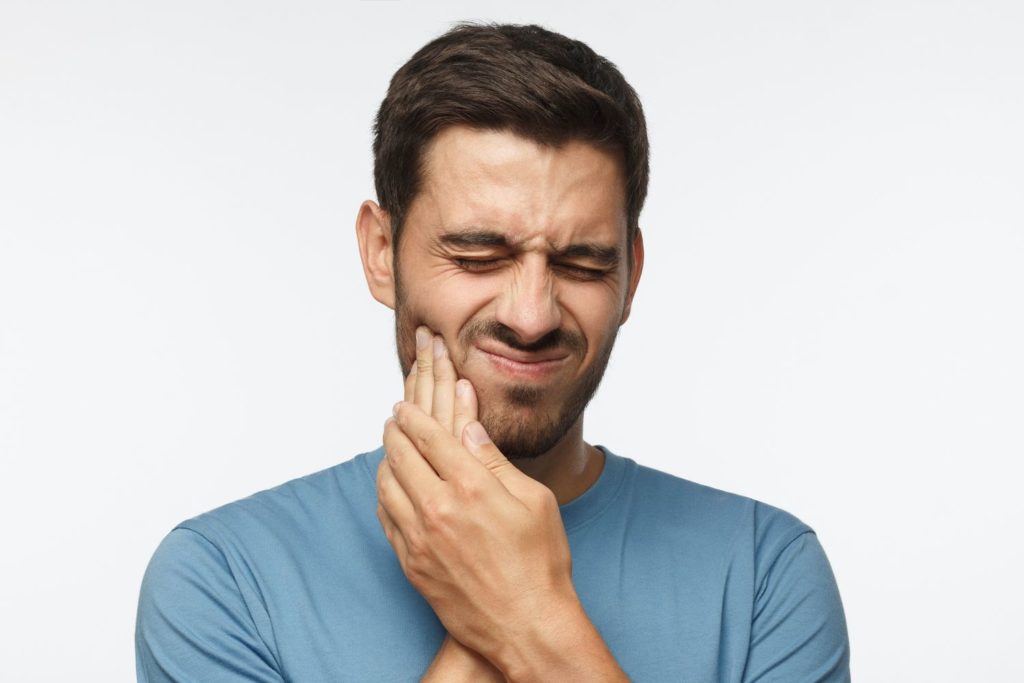Do you ever wake up with a sore jaw, a headache, or teeth that feel sensitive? You might be grinding your teeth or clenching your jaw at night without even knowing it. This common habit is called bruxism, and it’s often related to stress, anxiety, or how you sleep.
While occasional grinding might not seem like a big deal, doing it regularly can cause real damage. It can wear down your teeth, cause pain in your jaw muscles, and even lead to bigger dental problems.
The good news is that you don’t have to live with it. If you think you might be grinding your teeth, talking to your dentist is a great first step. They can provide solutions to protect your smile while you sleep and help you feel better each morning.

How Teeth Grinding Wears Down Your Enamel
Think of your teeth like a bar of soap. Every time you rub two surfaces together, a little bit wears away. That’s exactly what happens when you grind your teeth. The constant grinding and clenching, especially while you sleep, acts like sandpaper, slowly wearing down the protective outer enamel.
Enamel is the hardest substance in your body. Even stronger than bone. Its job is to act like a suit of armor. Enamel shields the sensitive inner layers of your teeth from bacteria, acid, and extreme temperatures. But unlike bone or skin, enamel can’t repair itself once it’s gone.
When you grind your teeth, you’re doing more than just dulling the chewing surfaces. You’re literally scrubbing away this protective shield. This makes your teeth shorter, flatter, and more vulnerable over time.
As the enamel thins, the underlying layer of your tooth, called dentin, becomes exposed. Dentin is much softer and is full of tiny tunnels that lead directly to the tooth’s nerve center. This is why teeth become incredibly sensitive to hot, cold, or sweet foods and drinks. The nerves are no longer well-protected.
Without that strong enamel barrier, your risk for cavities skyrockets because bacteria can attack the tooth more easily. In severe cases, grinding can even cause cracks, chips, or fractures in the teeth. You’ll need major dental work like crowns or root canals to repair them.
The damage from grinding is often gradual, so you might not notice it until real problems appear. Protecting your enamel with a night guard isn’t just about comfort. It’s about preserving the long-term health and strength of your teeth.
How Teeth Grinding Causes Headaches and Jaw Pain
If you grind your teeth at night, you might often wake up with a headache that feels like a tight band around your temples or a dull ache near your ears. This isn’t a coincidence. It’s a direct result of the tremendous pressure placed on your jaw joints and muscles while you sleep.
When you grind or clench, you’re overworking the large muscles that control your jaw. These muscles are connected to your head, neck, and even your shoulders. Just like any other muscle that’s overused during exercise, these jaw muscles can become sore, strained, and fatigued. This muscle tension is what causes those morning headaches, which can sometimes last throughout the day.
This constant strain can cause a more serious condition we call Temporomandibular Joint Disorder, or TMD (often called TMJ). Your temporomandibular joints are the hinges that connect your jawbone to your skull. Grinding your teeth forces these joints out of their proper position and puts excessive stress on them. This can cause inflammation, pain, and even damage to the joint itself.
The problems don’t stop there. TMD can cause pain that radiates throughout your face or even feels like an earache. You might notice clicking or popping sounds when you open your mouth, or find it hard to open wide without pain. In severe cases, the jaw can even lock open or closed, which may need medical intervention.
The good news is that treating teeth grinding can often relieve these painful symptoms. Using a custom night guard from your dentist can significantly reduce the pressure on your joints and muscles. They can help prevent the headaches and long-term damage caused by grinding.
How Teeth Grinding Can Cause Chipped and Broken Teeth
Grinding can also cause sudden and serious damage. Think of your teeth like a piece of glass. Even though glass is hard, too much pressure in the wrong spot can make it crack or chip. That’s exactly what can happen to your teeth when you grind them.
The force from clenching and grinding is incredibly powerful. Much stronger than the pressure you use for chewing. This intense stress is focused on the weakest parts of your teeth, like the edges, points, and ridges.
Over time, this weakens the enamel. Once the enamel is compromised, even a normal bite can cause a tooth to chip, crack, or break.
A chipped or broken tooth does more than just affect your smile’s appearance. It can undermine your confidence and lead to bigger oral health problems. When a tooth is damaged, the inner layers become exposed to bacteria and acids. This makes the tooth far more vulnerable to decay and infection, since bacteria can easily enter through even the smallest crack.
What starts as a small chip can turn into a larger fracture, sometimes reaching the tooth’s nerve. This can lead to severe pain, sensitivity, and more extensive dental work like a root canal or crown.
Using a night guard is one of the best ways to protect your teeth from this kind of damage. It acts as a cushion, absorbing the destructive forces of grinding and preventing direct tooth-on-tooth contact. This simple step can help you avoid painful fractures and keep your smile strong, healthy, and intact.
